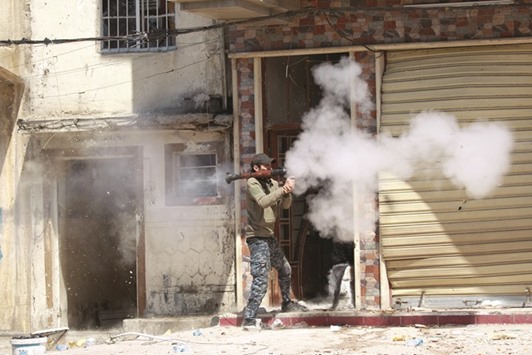More than 300,000 people have fled Mosul since the start of the US-backed campaign in October, the office of the UN Humanitarian Co-ordinator in Iraq said in a statement.
Before the operation to drive Islamic State from the city began, Mosul had a population of about a million and half, split about evenly between the areas east and west of the Tigris river that runs through the middle.
Iraqi forces captured the eastern side in January and in February launched a second phase to take the western side, with air and ground support from a US-led coalition.
They are now battling to take the northwestern part, but the civilian death toll has mounted in the old city, where the militants are dug in amongst residents.
More people are expected to flee the fighting and camps for the displaced north and east of Mosul are expanding, the UN
statement said.
Air strikes on the city by the Iraqi air force resumed yesterday as the sky cleared after several days of bad weather, the Iraqi military said.
The Iraqi air force carried out at least three air strikes in western Mosul, killing several dozens of Islamic State fighters, according to Iraqi military statements yesterday.
A number of Islamic State commanders were killed in an air strike on a position in Hay al-Tanak, a stronghold of the group, they said.
Among those killed were commanders in charge of booby traps, of suicide fighters and child recruitment, the statement added, without identifying them by name.
The two other strikes killed militants and destroyed weapons and vehicles.
Islamic State’s media outlets did not mention the strikes when they aired comments from Abi al-Hassan al-Muhajer, who took over the role of spokesman after the death last year of the group’s notorious media head, Abu Mohamed al-Adnani, in an air strike.
“O soldiers of the caliphate, beware not to withdraw from any inch before turning it into hell,” he said in an audio recording on Telegram, echoing a similar call made by Islamic State leader Abu Bakr al-Baghdadi when the campaign on Mosul started.
“Ambush them in the houses, the alleyways and the streets, mine the arcades and carry out raid after raid,” he said.
A Reuters TV crew saw dozens of people fleeing their homes near or across the frontline, braving sniper and mortar fire, while a helicopter strafed positions further north.
“Shells were falling on us and there is no food, no water, no electricity,” said Hamda Bakheet, a woman in her mid-60s from the Nablus district, adding that the militants were firing on people who leave the city.
Bakheet said one of her sons was killed when the militants first overran Mosul and the other was accused of being a “renegade” and jailed a year ago. “I hope the army will free him soon.”
The improved weather should also allow ground forces to resume their advance toward the Grand al-Nuri Mosque, where Baghdadi, declared a “caliphate” nearly three years ago over parts of Iraq and Syria.
Heavy fighting with machine guns, rocket propelled grenade launchers and mortars was heard by the Reuters TV crew coming from the area around the mosque, located in the old city and famous for its leaning minaret.
Kushner meets Iraq Kurd leaders
President Donald Trump’s son-in-law and the US’ top military officer met with Kurdish leaders in Arbil yesterday, the second day of their visit to Iraq.
His inclusion in the US delegation is a sign of the influence wielded by Jared Kushner, a 36-year-old with no prior government experience who has become one of the most powerful men in Washington by virtue of his family connection to Trump.
Kushner — whose wife Ivanka also plays a key role in advising her father — accompanied General Joseph Dunford, the chairman of the Joint Chiefs of Staff, on a visit to Baghdad before heading to Arbil, the capital of Iraq’s autonomous Kurdish region.
Kushner and Dunford met with officials including Kurdish leader Massud Barzani and the region’s prime minister Nechirvan Barzani in Arbil, but journalists were ushered out before the talks got underway.

